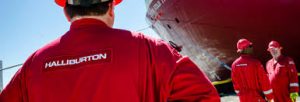
Houston-based Halliburton is reporting a fourth quarter of 2017, citing a loss of $805 million or nearly one dollar per diluted share. But company management still says it was a good quarter for the company’s operations including the large facility in Duncan, Oklahoma.
The loss was $0.92 per share and the company said it reflected charges related to U.S. tax reform and Venezuela receivables. The company’s adjusted income from continuing operations was $03.53 per diluted share. But the adjusted income totaled $462 million, compared to $365 million or $0.42 per diluted share in the third quarter of 2017.
The company’s reported operating income for the fourth quarter was $379 million compared to $634 million in the third quarter.
For the entire year of 2017, Halliburton’s total revenue was $20.6 billion, an increase of $4.7 billion or 30 percent from 2016. Reported operating income for 2017 was $1.4 billion compared to a reported operating loss of $6.8 billion for 2016.
“Outstanding execution resulted in an excellent fourth quarter and we are well positioned to take advantage of opportunities presented by a growing North America market and improving international outlook. I continue to believe we are on the path to normalized margins in North America in 2018,” remarked Jeff Miller, President and CEO.
Miller indicated the company’s Completion and Production division revenue grew 8 percent outperforming the change in average U.S. land rig count.
“I am optimistic about what I see in 2018. Commodity prices are supportive of increasing activity in North America and I am encouraged by the increase in tender activity and the positive discussions we are having with our international customers,” concluded Miller.
Completion and Production revenue in the fourth quarter of 2017 was $3.8 billion, an increase of $267 million, or 8%, from the third quarter of 2017, while operating income was $552 million, a sequential increase of $27 million, or 5%.
The company explained that in the United States land sector, higher pressure pumping activity and pricing led to increased revenue while higher costs and seasonality hindered profitability. Additionally, results improved due to year-end completion tool sales in the Gulf of Mexico, higher software sales in Latin America and increased stimulation activity in the Eastern Hemisphere.
The new federal tax reform laws also played a role in the company’s economic gain. Effective Jan. 1, 2018, Halliburton recorded an aggregate $882 million of non-cash discrete tax charges in the fourth quarter of 2017. It was due primarily to the preliminary tax provisions for the net income of the tax law.
However, Halliburton continues to experience delays in collecting payments on receivables from its primary customer in Venezuela, a country troubled by massive economic problems and political turmoil.
“These delayed payments, combined with recent credit rating downgrades and deteriorating market condition in Venezuela, required Halliburton to record an aggregate charge of $385 million during the fourth quarter,” stated the company’s news release.





